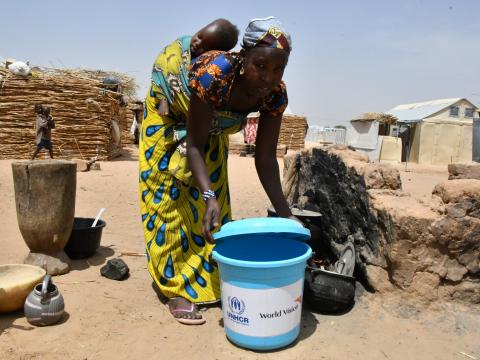Non-food relief items help ease Maria's burden

Since May 2019, the Maradi region has been experiencing an influx of refugees from northwestern Nigeria. They are fleeing killings, abductions, and looting by Nigerian non-state armed groups. These groups have increased attacks on both sides of the border in recent weeks, displacing around 18,000 people like 35-year-old Maria, a mother of seven. Losing everything was difficult for them because they did not have the basic necessities to begin with.
"After the attack on our village, I fled with my family and moved to Niger”, narrates Maria. “My children were sleeping on the ground because I didn't have money to buy mats. I rarely bathed my children because I didn't have buckets to fetch water. Even to bathe them, I had to go and borrow these materials in the next village. I was doing the same thing when I wanted to wash clothes and dishes."
When the crisis began, the United Nations High Commissioner for Refugees (UNHCR) quickly deployed an emergency team. A sub-office opened in Maradi in September 2019 to coordinate registration, protection, education, health, shelter and access to water and sanitation. Another major element of UNHCR's response is the relocation of refugees to "opportunity villages" away from the border to ensure their safety and ease the pressure on host populations. This programme contributes to the development of rural areas that lack basic infrastructure and services, in line with the humanitarian development nexus.
Entire populations have left their homes, leaving everything behind and moving to neighbouring villages. It is in order to ease affected families' burden that that World Vision, in collaboration with UNHCR, set up an emergency intervention in the Dan Dadji Makaou refugee site to carry out distributions of non-food items to relieve refugees like Maria and her family.
"Fortunately for us, World Vision and UNHCR came to rescue us by distributing materials”, shares Maria. “I received two 20-litre cans, two 20-litre plastic water buckets, two kettles, four bars of soap, a potty for children, a plastic shovel and a cup. I am very grateful because thanks to these materials I have buckets where I can put enough water to bathe my children and do the laundry and dishes.”
Maria further adds: “I am not only happy for myself but I am also happy for all the households who live on this site who received these materials because it will help them a lot. We all came empty-handed, some had only one cloth to wear, but with those kits that we received, households will be able to meet their water and sanitation needs."
After a difficult period, it is with great relief that Maria's family and 2,365 other households received kits worth more than 90,000,000 CFA (US$181,000).